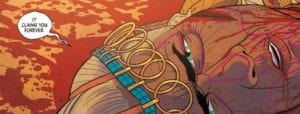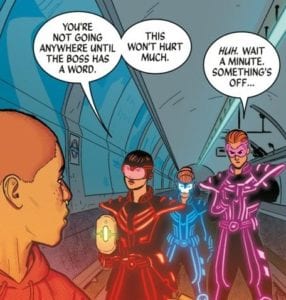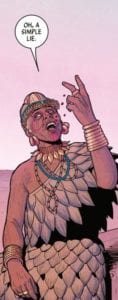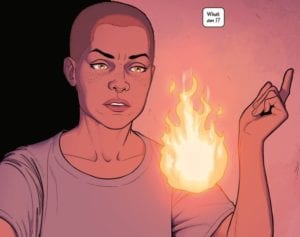A lot can happen in the span of ten days. A life can well go on undisturbed with no major changes, or one’s world could completely and irreversibly turn on its head. Ten days is a perfectly acceptable period to outline a threshold, a dividing point between a ‘before’ and the ‘now’. But what kind of change would ten days entail in a world where teenagers can divide their (short) lives in “before Godhood” and “now, everything is ruined forever”? Well, not all transformations occur with grandiose transformations, or a gradual process of decay. Sometimes, all it takes is one decision… and it’s not even one only afforded to Gods.
Naturally, spoilers ahead.
Issue #39
“The cycle breaks, I see.”
This issue begins with a feast of villainy outside of the Norns’ cell. Main course is two very distinct variants: the evil that gloats – it being Woden, and the evil disguised as innocence – it being Minerva. It’s a real shame that, despite being the one who sees and speaks the truth, Urdr cannot see Minerva’s true role in all of this. And even if she did, nobody would believe her. A moment later, Woden and Minerva have a chat away from Urdr’s hearing. You know, going over a few ins-and-outs of their evil plan. We know of Minerva-Ananke’s endgame, but Woden’s remains still a bit foggy. Ultra overlord-ish hedonism comes to mind, but we probably can expect to be surprised.
There’s some relatively mundane chat going on too. Basically everybody wondering what everyone still alive is up to these days. A briefly mentioned, but still important, angle is whatever Baal Hammon has in store. According to Minerva, he’s brooding quite a bit, but he’ll still make it for his big ritual, which is undoubtedly related to the Great Darkness. And yes, that’s another mystery we got on our hands.
Woden’s work at the moment is to replicate Dionysus’ mind control powers. It is here that Minerva draws a line by asking him if he would use those powers to mind-control (rape) Urdr into having sex with him. Following a brief pause, the scumbag responds by saying he’s not after her body, but her powers. His answer is actually a bit longer than that, and while it’s a negative, it doesn’t strike as definite as a simple ‘No’. So, we’ll see. It’s important to note here that even one like Minerva-Ananke looks down on rapists; rape is indeed a very special kind of evil.

Next item on the list: Persephone. Is she alive still or not? Judging by Minerva’s reaction upon finding out Persephone’s pregnant, her death is definitely a priority. Woden, ignorant of the history between Ananke and the Proto-Persephone, downplays its importance, sure that she’s committed suicide. However, an incoming transmission from his lackeys reveals Laura is still very much alive. Woden sends out a party to take care of Persephone while Minerva, still in the control room, sets the weaponry to kill settings.
She cannot take any chances, and we’ll know the reason… because it’s Flashback time!
4000 BC-ish, the moment right after Ananke stabs her sister into a bloody mess. Before she walks away, knife still in hand, Persephone keeps the game going by speaking a fourth rule in her dying throes. If her God has a child, the cycle is broken, and the Great Darkness claims Ananke forever. The Mother bearing a Child would thus override Ananke’s presence as the Maiden. So this little huge reveal not only explains why Minerva freaked out about Laura being pregnant; it also reveals that the Great Darkness was not actually another gambit up Ananke’s sleeve. It’s something real, and quite a bit worse than ninety years of darkness after a botched ritual.
Four is death indeed. Therefore, the ominous motif of music and numerology turns out to be Ananke’s boogeyman.
Back to the present day, Woden’s lackeys appear before Laura, who looks very different from last time we saw her. And those new lackets? They’re Beth’s crew, looking absolutely ridiculous. Laura takes advantage of Toni’s flourish to sneak into an elevator going into the subway. If she makes it to the Underground, she’s safe. Unfortunately, the shiny stooges beat her to it. Beth holds her at fancy gunpoint, intending to take her to Woden for interrogation, however Robyn notes that Laura doesn’t show up as a God anymore. Laura explains this is because she stopped being a God ten days ago.

Beth being Beth (an envious fool, that is), cannot understand why Laura would quit being Persephone, or why would she be around. However, Robyn knows the answer to the latter, as she compassionately remarks that she knows there is an abortion clinic nearby. Laura is no longer to be the Mother, much to Minerva’s apparent relief. Whether this will truly aid the villain’s endgame or not, one thing is for sure: her body, her choice; real, fictional or otherwise. However, though looking quite haggard on the outside, Laura’s inner monologue doesn’t show its full and yet. And Minerva knows this – that’s why she urges Woden and his goons to take her in anyway.
But again, Beth being Beth (a careless fool, that is), disobeys the command. She underestimates Laura by spitefully deeming her a nobody now. It’s quite funny and pathetic, really – and I’m not talking about Laura. Anyway, Beth, Robyn and Toni let her go. And Woden doesn’t seem to be minding much, either; all in all, it’s one God less to worry about. They’re all underestimating our girl! Especially Minerva, as she goes to the bathroom to gloat at the mirror, thinking the means to her next return are assured.
But… there’s always a but. And it’s not always something that follows, but something that precedes… FLASHBACK TIME!

4000 BC-ish a few hours before Proto-Persephone’s death at the hands of her sister. The Goddess has a chat with her grandson over supper. Before we go on, I need remind everyone that Jamie McKelvie is an absolute ace at what he does, especially when it comes to facial expressions. This is golden considering what the Goddess is about to tell the young man. She urges him to run away as fast as he can when Ananke catches up – she will have the rest covered. As they munch on some fruit and seeds, the first Persephone pretty much predicts what her sister will do. So, before her final breath, she will pull a trick on her.
A fourth, false rule. A lie that will haunt her for the rest of her days, and thus will lead her into misdirecting her efforts. That will be the chance for the rest of the Gods to eventually overthrow her by seizing that blind spot. The faith that the young Gods, that humanity will figure it out – that’s her ultimate gambit. It may sound kind of flimsy, but remember – the big events, the beliefs and the ensuing deeds; they stem from stories and the value we place on them. This is especially true for the Gods.
Laura’s abortion doesn’t mean a thing. Minerva’s been fooled into thinking herself the victor already. But Persephone has something else, she has the knowledge, the realisation that she’s not actually a God. After hitting rock bottom from the events she’s experienced, this triggered a change in mentality for Laura. All of the labels, narratives and definitions she’s been given, from God, to Destroyer, to Ascended Fangirl. They don’t actually stick. She doesn’t know what she is. We don’t know what she is, either. Because we’re not talking about an existential issue… not when she still, to this moment, retains Lucifer’s powers.

The Wicked + The Divine Issue #39 Credits
Writer: Kieron Gillen
Art / Cover: Jamie McKelvie, Matt Wilson
All images are courtesy of Image Comics

